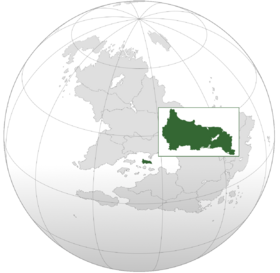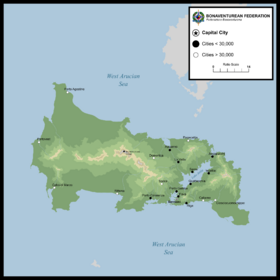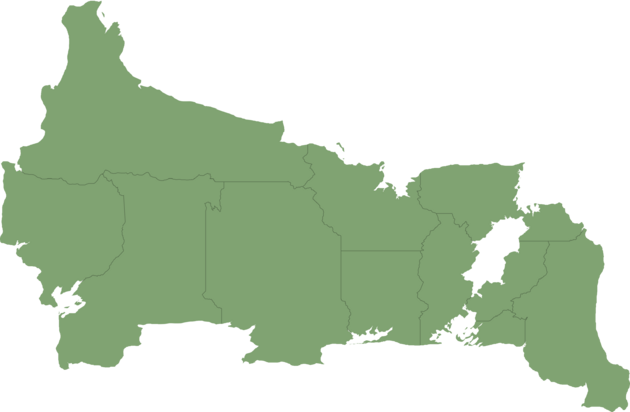Bonaventura: Difference between revisions
No edit summary |
No edit summary |
||
| Line 112: | Line 112: | ||
The island has been populated by the {{wpl|Taino people|Natí}} people since 200 BCE and experience an increase in their population during 9th century CE. During the same time, the [[Ardesia#history|Zapoyan Empire]] landed in Bonaventure's northern coast, and quickly established the land as an important location for the seafare commerce in the Arucian Sea. While the Zapoyan influence in Bonaventure grew exponentially, many other Arucian people such as the Natí and the [[Marai people|Marai]] could be found in the island, given it was the Zapoyan's main commercial point within the Arucian Sea. The island remained under the control of the Zapoyans until [[Assim Asteris]] and his expedition first harboured in Bonaventure. The [[Etruria|Etrurian]] occupation of the [[Assimas Island]] also drove their attention to the Bonaventure. The first Etrurian settlement in Bonaventure was established in 1523, and the Insular War of 1536, led by [[Giacomo Borghese]], put and end on the Zapoyan rule of the island and settled Bonaventure as the Etrurian colony of [[New Accadia]]. | The island has been populated by the {{wpl|Taino people|Natí}} people since 200 BCE and experience an increase in their population during 9th century CE. During the same time, the [[Ardesia#history|Zapoyan Empire]] landed in Bonaventure's northern coast, and quickly established the land as an important location for the seafare commerce in the Arucian Sea. While the Zapoyan influence in Bonaventure grew exponentially, many other Arucian people such as the Natí and the [[Marai people|Marai]] could be found in the island, given it was the Zapoyan's main commercial point within the Arucian Sea. The island remained under the control of the Zapoyans until [[Assim Asteris]] and his expedition first harboured in Bonaventure. The [[Etruria|Etrurian]] occupation of the [[Assimas Island]] also drove their attention to the Bonaventure. The first Etrurian settlement in Bonaventure was established in 1523, and the Insular War of 1536, led by [[Giacomo Borghese]], put and end on the Zapoyan rule of the island and settled Bonaventure as the Etrurian colony of [[New Accadia]]. | ||
New Accadia remained a colony until October 6th, 1946, when Etruria's defeat in the [[Solarian War]] put an end to their colonial empire. Eleven days following its independence, New Accadia was acquired and taken as part of the [[United Provinces (Kylaris)|United Provinces of the Western Arucian Islands]]. The United Provinces remained united until the departure of Imagua and the Assimas, in 1948, and it dissoluted permanently in 1954, with the departure of [[Sainte-Chloé]] and [[Carucere]] after a [[United Provinces (Kylaris)#constitutional crisis|constitutional crisis]] within the Union. New Accadia carried on the name of United | New Accadia remained a colony until October 6th, 1946, when Etruria's defeat in the [[Solarian War]] put an end to their colonial empire. Eleven days following its independence, New Accadia was acquired and taken as part of the [[United Provinces (Kylaris)|United Provinces of the Western Arucian Islands]]. The United Provinces remained united until the departure of Imagua and the Assimas, in 1948, and it dissoluted permanently in 1954, with the departure of [[Sainte-Chloé]] and [[Carucere]] after a [[United Provinces (Kylaris)#constitutional crisis|constitutional crisis]] within the Union. New Accadia carried on the name of United Provinces for about 1 year and 3 months after its independence, when a popular referendum voted that the newly sovereign island would be named after the independence war hero, Quarto Bonaventura. | ||
Bonaventure is a {{wpl|volcanic island}} that lays on the Arucian faultline, a {{wpl|divergent boundary|divergent plate boundry}} between the .?.?.? and the .?.?.? plates. Such | Bonaventure is a {{wpl|volcanic island}} that lays on the Arucian faultline, a {{wpl|divergent boundary|divergent plate boundry}} between the .?.?.? and the .?.?.? plates. Such conditions have resulted in the formation of the [[Iacattuotili Valley]], alongside the formation of [[Lake Attila]], the biggest and deepest lake in the Arucian island. This geographic placement, however, has affected Bonaventure with many natural disasters including the 1804 Sermoni earthquake, and the [[2020 Pico de Sangue eruption|2020 Mount Micchiano eruption]]. | ||
Bonaventure has the second biggest {{wpl|Gross domestic product|nominal GDP}} amongst the Arucian Nations at $26,3 billion, but the second lowest nominal GDP per capita at $7.993. The nation has | Bonaventure has the second biggest {{wpl|Gross domestic product|nominal GDP}} amongst the Arucian Nations at $26,3 billion, but the second lowest nominal GDP per capita at $7.993. The nation has experience in the {{wpl|service sector}}, with emphasis in the {{wpl|tourism}} and {{wpl|financial services}}. Bonaventure has been attractive to international investors due to its liberal economy and area size, however the 2020 Mount Micchiano eruption caused a tremendous shock to the national economy, and Bonaventure has been in an extensive economic crisis since then. Bonaventure is a member of the [[Community of Nations]], the [[Organization of Asterian Nations]], and co-founder of the [[Arucian Cooperation Organization]]. | ||
Revision as of 14:28, 28 April 2022
Bonaventurean Federation Vespasian: Federazione Bonaventurana | |
|---|---|
| Motto: "Negare e triunfare" (Estmerish: To deny and to triumph) | |
| Anthem: "Madrepatria" (Estmerish: Motherland) | |
 Location of Bonaventura in the West Arucian Sea in green. | |
 Detailed map of Bonaventure | |
| Capital and | Sermoni |
| Official languages | Vespasian |
| Recognised national languages | Venturan |
| Recognised regional languages | Astapasian Carpasian Natí Zapoyan |
| Demonym(s) | Bonaventurean |
| Government | Federative presidential republic |
• President | Vinicio Nardiello |
• Vice President | Liberio Ceci |
• President of National Assembly | Euseo Di Marino |
| Legislature | National Assembly |
| Formation | |
| Area | |
• | 40,015.36 km2 (15,450.02 sq mi) |
| Population | |
• 2020 estimate | 3,298,969 |
• Density | 82.44/km2 (213.5/sq mi) |
| GDP (PPP) | 2020 estimate |
• Total | $50,378,555,599 |
• Per capita | $15,271 |
| GDP (nominal) | 2020 estimate |
• Total | $26,368,659,217 |
• Per capita | $7,993 |
| HDI (2020) | 0.796 high |
| Currency | Arucian shilling (ſ) (ARS) |
| Date format | dd-mm-yyyy |
| Driving side | right |
| Calling code | +5 |
| ISO 3166 code | BON |
| Internet TLD | .bv |
Bonaventure (Vespasian: Bonaventura), also known as the Bonaventurean Federation (Vespasian: Federazione Bonaventurana) is a sovereign island nation located in the West Arucian sea, in between the continents of Asteria Superior and Asteria Inferior. Bonaventure has maritime borders with Ardesia to the north, Aucuria to the southeast, Eldmark to the west, and Imagua and the Assimas to the south, with whom Bonaventure has a territory dispute over the small Dunhelm Island. As of 2020, Bonaventure has a population of 3,298,969 people, and a land area of 40,015.36 square kilometers, being the second biggest and second most populated of the Arucian islands. The capital and biggest city of Bonaventure is the city of Sermoni, located in the .?.?.? bay, in the southern coast of the island.
The island has been populated by the Natí people since 200 BCE and experience an increase in their population during 9th century CE. During the same time, the Zapoyan Empire landed in Bonaventure's northern coast, and quickly established the land as an important location for the seafare commerce in the Arucian Sea. While the Zapoyan influence in Bonaventure grew exponentially, many other Arucian people such as the Natí and the Marai could be found in the island, given it was the Zapoyan's main commercial point within the Arucian Sea. The island remained under the control of the Zapoyans until Assim Asteris and his expedition first harboured in Bonaventure. The Etrurian occupation of the Assimas Island also drove their attention to the Bonaventure. The first Etrurian settlement in Bonaventure was established in 1523, and the Insular War of 1536, led by Giacomo Borghese, put and end on the Zapoyan rule of the island and settled Bonaventure as the Etrurian colony of New Accadia.
New Accadia remained a colony until October 6th, 1946, when Etruria's defeat in the Solarian War put an end to their colonial empire. Eleven days following its independence, New Accadia was acquired and taken as part of the United Provinces of the Western Arucian Islands. The United Provinces remained united until the departure of Imagua and the Assimas, in 1948, and it dissoluted permanently in 1954, with the departure of Sainte-Chloé and Carucere after a constitutional crisis within the Union. New Accadia carried on the name of United Provinces for about 1 year and 3 months after its independence, when a popular referendum voted that the newly sovereign island would be named after the independence war hero, Quarto Bonaventura.
Bonaventure is a volcanic island that lays on the Arucian faultline, a divergent plate boundry between the .?.?.? and the .?.?.? plates. Such conditions have resulted in the formation of the Iacattuotili Valley, alongside the formation of Lake Attila, the biggest and deepest lake in the Arucian island. This geographic placement, however, has affected Bonaventure with many natural disasters including the 1804 Sermoni earthquake, and the 2020 Mount Micchiano eruption.
Bonaventure has the second biggest nominal GDP amongst the Arucian Nations at $26,3 billion, but the second lowest nominal GDP per capita at $7.993. The nation has experience in the service sector, with emphasis in the tourism and financial services. Bonaventure has been attractive to international investors due to its liberal economy and area size, however the 2020 Mount Micchiano eruption caused a tremendous shock to the national economy, and Bonaventure has been in an extensive economic crisis since then. Bonaventure is a member of the Community of Nations, the Organization of Asterian Nations, and co-founder of the Arucian Cooperation Organization.
Etymology
The name “Bonaventure” is originally used after the Etrurian sailor, Giuseppe Bonaventura, who established the first settlement in the island in 1510. The name is also a reference to Saint Bonaventura, and it is believed that Giuseppe Bonaventura had his name given as an homage to the Catholic Saint. Linguists, however, believe that the name “Bonaventura” also means “land of good fortune,” as bona seems to be a viariant of the Vespasian buona (good), and ventura seems to be a variant of the Vespasian fortuna (luck, good fortune).


